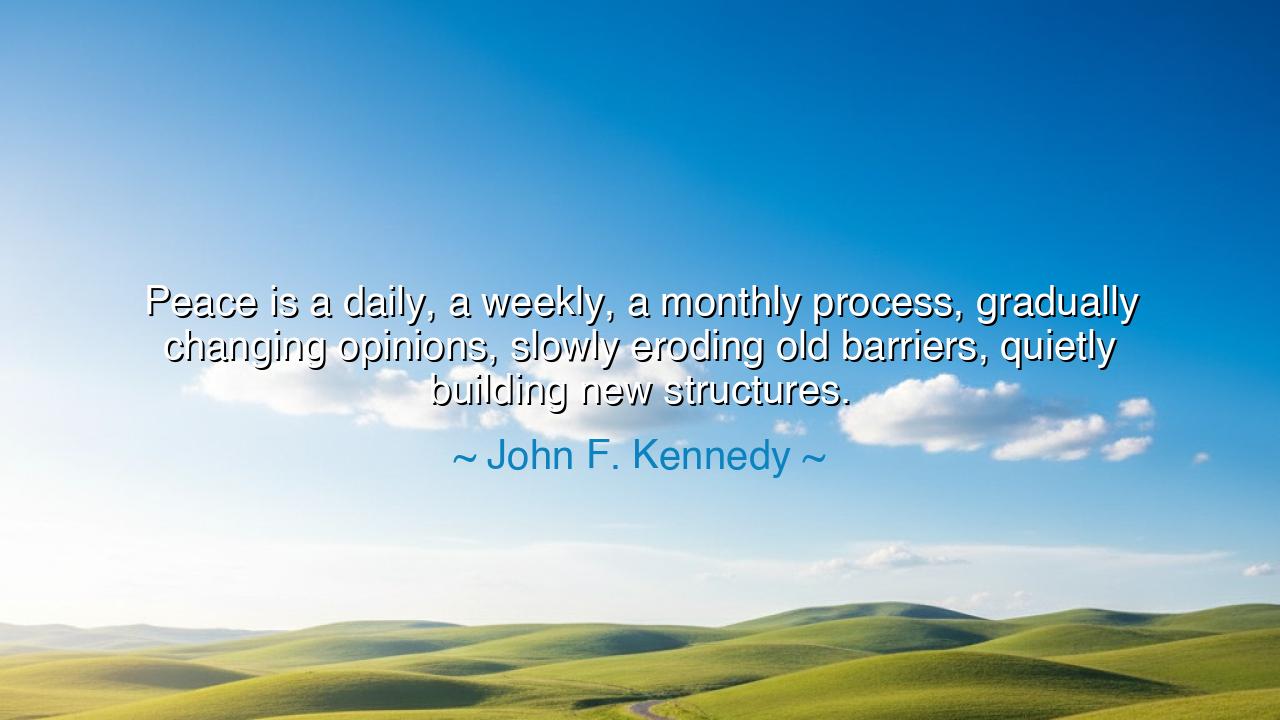
Peace is a daily, a weekly, a monthly process, gradually
Peace is a daily, a weekly, a monthly process, gradually changing opinions, slowly eroding old barriers, quietly building new structures.






John F. Kennedy, standing at the helm of a world threatened by division and destruction, declared with calm strength: “Peace is a daily, a weekly, a monthly process, gradually changing opinions, slowly eroding old barriers, quietly building new structures.” These words do not speak of peace as a sudden gift bestowed upon humanity, but as a patient labor, a long and steady pilgrimage. He tells us that peace is not an event, but a journey; not a single act, but a continual weaving of understanding and trust.
The origin of this wisdom lies in Kennedy’s presidency, an age shadowed by the Cold War, when the great powers stood poised on the brink of annihilation. In such a world, peace could not be commanded in a single breath, nor secured in one treaty. It had to be nurtured like a fragile seed—through small gestures, cautious dialogue, gradual trust, and the dismantling of walls built by fear. Kennedy, who faced the Cuban Missile Crisis and knew how close mankind had come to its end, understood that the greatest victories are not found in conquest, but in the steady building of structures that prevent war before it begins.
His words remind us of a profound truth: peace is process. It demands patience, persistence, and faith in time itself. It is not loud like war, which roars with fire and iron, but quiet like a stream that carves valleys over centuries. The transformation of human hearts and societies does not happen in a moment. Prejudices, suspicions, and hatreds—these are ancient stones that cannot be overturned by mere command. They must be worn down, little by little, through daily acts of kindness, weekly steps of reconciliation, and monthly signs of progress.
History offers us a striking example in the long struggle against apartheid in South Africa. The walls of division were not torn down in a day. It took years of quiet resistance, daily sacrifices, negotiations, and the tireless work of leaders like Nelson Mandela and Desmond Tutu. Slowly, the old barriers of hate and fear eroded, and new structures of democracy and unity were built. The victory of peace came not with one proclamation, but through countless days of faithful endurance—just as Kennedy had envisioned.
Yet Kennedy’s words also remind us that peace begins not only among nations, but within ourselves and our communities. How often do we imagine that reconciliation can come in a single conversation, only to find old wounds still raw? His counsel is to persevere—to return daily, weekly, monthly to the work of forgiveness, to continue building bridges even when progress seems slow. For true peace is not forged in haste; it is sculpted by patience, humility, and the courage to keep trying when others have grown weary.
The lesson is timeless: if you desire peace, do not wait for a single grand gesture. Begin in the small things. Speak kindly today. Listen humbly tomorrow. Challenge prejudice next week. Support justice month by month. Each act may seem small, but together they wear down the ancient stones of division. Peace is not lightning; it is dawn. It rises slowly, and only those who endure the night see its full light.
Practically, this means we must commit to being artisans of peace in our daily lives. Do not be discouraged by the slowness of change. If reconciliation with a friend takes months, persist. If unity in a community takes years, endure. If peace among nations takes generations, then plant seeds you may never see flower. Kennedy’s wisdom teaches us that every step matters, and that the structures we build quietly today may shield the children of tomorrow.
Thus, let us remember his words as a sacred charge: “Peace is a daily, a weekly, a monthly process.” Let them guide us to patience when we grow restless, to persistence when we grow weary, and to faith when we grow doubtful. For though war shouts, peace whispers; though conflict erupts, peace is sown. And in the slow labor of the faithful, the world is changed—not by sudden conquest, but by the steady triumph of becoming whole.






AAdministratorAdministrator
Welcome, honored guests. Please leave a comment, we will respond soon